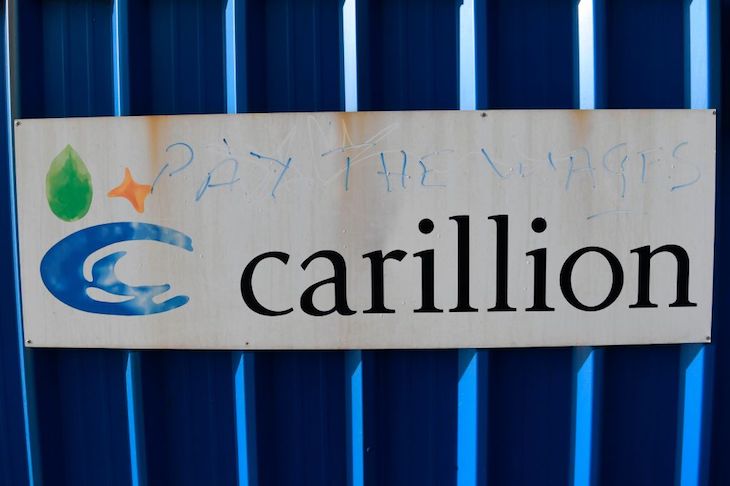Carillion is a disaster on all fronts, but my sympathies go first to the fallen contracting giant’s sub–contractors. Upwards of 30,000 smaller firms were already facing 120-day payment delays and may now have to fight court battles to get paid at all, driving many hard-pressed entrepreneurs to bankruptcy. But the political spotlight won’t help them, because Labour spokesmen who despise small business as well as large will merely use the case to attack the concept of outsourcing public services for private-sector profit.
And that debate will continue to miss the central point that Carillion has not crashed because it held too many school-meal contracts, but because of delays and cost overruns in civil engineering projects such as the Aberdeen bypass and big new hospitals in Birmingham and Liverpool. Civil engineering businesses traditionally tend to be undercapitalised, relying on debt to manage the hair-raising cashflows of their project portfolios. Carillion was formed from many such businesses — starting in 1999 with the construction arms of Tarmac and Wimpey and adding Mowlem, McAlpine and others — but instead of gaining strength through amalgamation, it multiplied risk.
Carillion’s catastrophe is not a parable of the evils of outsourcing, which remains the best value-for-money mechanism for many kinds of service delivery in both public and private sectors. Rather it’s a cautionary tale of lax financial control in over-expanded conglomerates. The best outcome now for some of its constituent firms would be to re-emerge from the rubble as independent operators — offering government a wider, safer range of contractors from which to choose.
Hard nose needed
Lib Dem leader Sir Vince Cable — who has appointed himself unofficial shadow business secretary in the absence of anyone credible on the Labour benches — says ministers should block a potential takeover of GKN by the mini-conglomerate Melrose. The former is a venerable British engineering business with a global reputation. The latter, founded in 2003 on the model of Hanson Trust from the 1980s, is an exponent of what this column has called ‘a hard-nosed, finance-driven form of capitalism, but one that creates efficiency and value’ by buying underperforming industrial companies, improving them, selling them and returning cash to grateful investors.
Melrose claims to have outperformed GKN 18 times over in ‘total shareholder return’ since 2003 and that it can ‘re-energise and re-purpose’ GKN far more effectively than the GKN board’s own hasty plan to demerge its automotive and aerospace component arms. Cable says Melrose are short-termists whereas GKN ‘stands for long-term investment in advanced manufacturing’. In the current mood of distrust for hard-nosed capitalists, his sentiments may strike a chord. But I think he’s wrong. Melrose is a focused small-team venture working to a proven turnaround template. GKN — which dumped its newly appointed chief executive after a profits warning in the autumn — needs a shake-up. Other canny bidders may enter the fray alongside Melrose. It’s the way of the world, and the valuable businesses within GKN will emerge all the better for it.
This winter’s NHS tale
Is the NHS catastrophically under-resourced and overstretched, through no fault of its own; or is it a mismanaged monster that could reduce many of its problems if only it adopted more models from consumer-facing companies? Here’s a seasonal anecdote…
Scene One: a flagship hospital in the north of England, Sunday morning. Elderly Patient in A&E cubicle: ‘Can I have a drink of water?’. Nurse: ‘Sorry, love, no plastic cups, they forgot to order any.’ Next of Kin (your columnist): ‘Why are you writing my details on a paper towel?’ Nurse: ‘I’ll put them in the computer when I’ve got time.’ NoK: ‘Well at least they ordered paper towels.’ Passing cleaner, in the manner of WW2 black-marketeer: ‘Pssst! You wanna plastic cup?’ NoK, a long time later: ‘Is something going to happen soon?’ Nurse: ‘Haven’t you been watching the news, love? This is the NHS. Our target’s four hours to be treated or admitted. This patient’s close to that now so I expect we’ll move her to a ward as soon as there’s a bed.’
Scene Two: Sunday afternoon, in an ‘assessment’ ward. EP: ‘Can I have some paracetamol for a headache?’ Healthcare assistant: ‘Sorry, love, there’s no one here authorised to dispense them.’ NoK: ‘Shouldn’t she at least take the regular pills she brought in with her, which no one’s bothered to look at yet?’ Nurse: ‘Oh yes, she could do that.’
Scene Three: Monday afternoon, at Costa Coffee in the hospital concourse. NoK: ‘Well at least at Costa they’ve still got cups — and staff who smile.’ EP, confused and exhausted: ‘Have they told us anything we didn’t know before I came in?’ ‘No.’ ‘Have they given me any new medication?’ ‘No.’ Do I have to go back to that terrible ward?’ ‘No. Let’s run for it. The longer you stay the worse you’ll feel. I just have to pay the car-park ticket — but there’s only one machine and it only takes coins, so there’s an enormous queue…’
Bitcoin winners
I invited readers to justify following the example of New York banker Jamie Dimon’s daughter, who is a buyer of Bitcoin, over the advice of her father, who says it’s a crash waiting to happen. ‘Lionel Shriver’s column, 6 Jan’ was a good answer but too short to win the competition. Runner-up is 14-year-old Larissa Isaacs, who says she respects her father but as a ‘forceful modern woman’, doesn’t feel she has to do what he says. Joint winners are Bernard Kerrison, quoted last week, and Matthew Quirk’s Kipling pastiche: ‘If you can see how markets move the many,/ And how the many move the markets in return…’ Meanwhile, the hot news is that Russia plans to legalise crytocurrency trading in the hope of grabbing a big slice of this fast-growing global market. Sounds like McMafia to me.







Comments